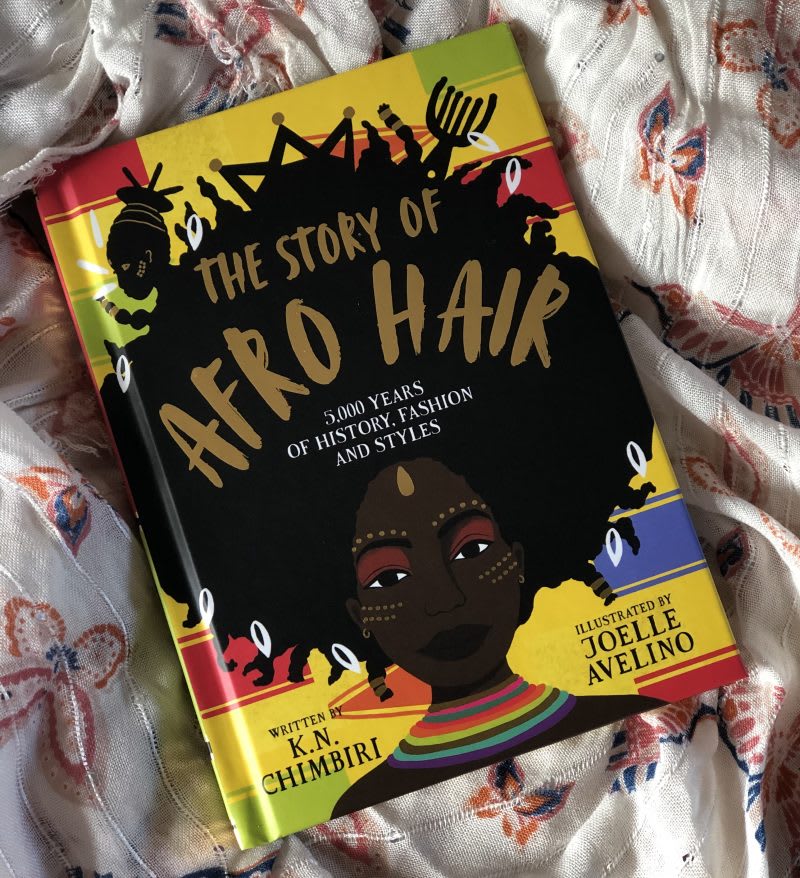Book Review: The Story of Afro Hair by K. N. Chimbiri and illustrated by Joelle Avelino

Public history is changing. Books, documentaries and films are increasingly encompassing cultures and experiences that have previously been ignored or silenced. Children’s publishing is playing a big part in this change and new books that share diverse histories are now occupying their rightful place on the shelves of bookshops and libraries.
The Story of Afro Hair, written by K. N Chimbiri and illustrated by Joelle Avelino, is a wonderful addition to the brilliant current range of historical non-fiction books for young readers. Taking Afro hair as a starting point for exploring the past, this book centres Black narratives through 5,000 years of history. Beginning with an explanation of the biology of hair and the reason that Afro hair is curly, Chimbiri leaps back in time to Ancient Egypt and travels through the Nok civilisation (in what is now Nigeria) to the Great Benin kingdom of West Africa in the Middle Ages. European colonisers began to enslave African people in the 1500s and Afro hair gained a new kind of sinister significance. Shaving the head of an enslaved person was a form of punishment and the descriptions of enslaved people who had escaped their captors often included mention of their hair to identify them. This is powerful and important history that uses hair to show just one aspect of the violence that was inflicted upon those who were enslaved and how they were stripped of their identities
When the book’s narrative arrives in the twentieth century it uses lots of biographical case studies to introduce people who were important to the growth of the haircare industry and who, in turn, had wider cultural and political impacts. This includes significant figures such as haircare entrepreneurs Annie Turnbo Malone, Madam C. J. Walker whose products made her the first self-made American millionairess, performer Josephine Baker who sold her own product for styling Afro hair, Sara Spencer Washington whose success enabled her to directly support the civil rights movement in America, and Carmen England who opened the first-know Afro hair salon in Britain and went on to organise the Notting Hill Carnival. These incredible women celebrated their own cultural identities and laid the foundations for many others who have continued to do so right up to the present day, particularly in America and the UK.
The Story of Afro Hair also celebrates changes in hair fashions, and how they developed alongside other events including the Harlem Renaissance, the Rastafari movement, and the impact of performers in music and film. But this is more than a book about the fashion of a physical trait. This extraordinary piece of non-fiction views historical events from a new perspective and shows so many aspects of history that are specific to the experience of those with Afro hair. And that is why this book is so brilliant.
Joelle Avelino’s gorgeous illustrations fill the pages of this beautifully designed and colourful book. She shows us the hairstyles and put faces to the names that burst out of the text. I can’t find a credit for the design work on the book, but it’s beautifully done and this petite, shiny hardback is crammed with images that add to the narrative.
The future of history books is bright, smart and multicultural. The Story of Afro Hair is a perfect example of one of these books. It puts those forgotten and ignored voices back into the narrative, exactly where they belong.
The Story of Afro Hair is published by Scholastic.
For more information about K. N Chimbiri you can visit her website here and follow her on Twitter and Instagram. You can find out more about Joelle Avelino and see more of her amazing artwork on her website and on Twitter and Instagram.
Thank you to Scholastic for sending a proof copy for review purposes.
Disclaimer: This page contains affiliate links to bookshop.org and will redirect you to their website. If you make a purchase I will make a very small commission at no extra cost to you and they also share their profits with independent bookshops around the UK.